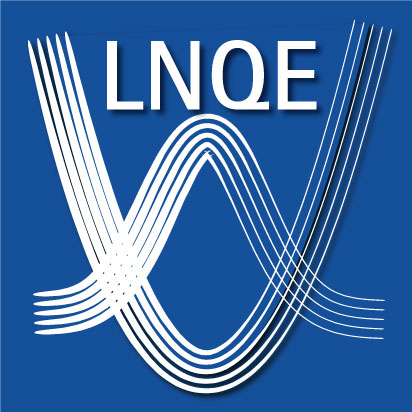The Lower Saxony Ministry for Science and Culture has approved twelve new doctoral programs, including the program "Hannover School for Nanotechnology: Interdisciplinary Approaches for Smallest sensors" (hsn-sensors). Granted were twelve Georg-Christoph-Lichtenberg-Scholarships and material and travel expenses for this purpose. The total grant amounts to 802 800, - EUR for the period from 01/10/2016 to 09/30/2020. The principal investigators are university teachers from the research center Laboratory of Nano and Quantum Engineering (LNQE) of Leibniz Universität and from the University of Applied Science and Arts in Hannover. Coordinator of the program is the LNQE board member Professor Dr. Rolf Haug.
The aim of the doctoral program hsn-sensors is the interdisciplinary training of young scientists on the highly topical field of nanotechnology with a focus on nanosensors. Nanotechnology is playing an ever greater role in the field of sensor technology. Sensors with nanoscale surfaces, sensors that transfer information from the nanoscopic world in the macroscopic world and sensors that use nanoeffects as sensor principle, can be collectively defined as nanosensors. A key feature of nanosensors is their small size which allows them to be produced cost-efficiently and excellently integrated into small electronic devices. Such nanosensors are based on new measurement effects have a significant improvement in sensitivity and selectivity compared to conventional sensors. However, they are allow also the possibility for the detection of parameters and materials that could not be detected before. Nanosensors are often based on different measurement principles than conventional sensors, which open up exciting possibilities for research and development.
The hsn-sensors has set itself the goal of providing outstanding education in excellent research projects with the shortest possible time to doctorate without quality loss. The ambitious goal is to obtain a PhD in the duration of fellowship in up to three years. This shall be achieved through a coordination of the master time in view of the subsequent promotion. For the most excellent students hsn-sensors offers a fast track option.
The issues and topics of the nanosensor technology can be worked on and solved only through close cooperation of different scientific disciplines. Involved are research groups from physics, chemistry and engineering. However, each discipline has its own scientific language, so often the communication across disciplines is very difficult. Therefore, a key objective of hsn-sensors is to guide the doctoral students to interdisciplinary work and train them. They will receive a tailor-made education program with nanotechnology courses as basic courses, sensing courses as special courses, seminars, symposia and courses to promote personal skills. According to the interdisciplinary nature of this doctoral program, each PhD student is supervised by two professors from different disciplines.
The Hannover School for Nanotechnology presents, building on the Bachelor and Master degree program nanotechnology at the Leibniz Universität Hannover initiated by the LNQE, the logical continuation of nanotechnology education in Hannover. Currently, the Hannover School for Nanotechnology, also promoted as Lower Saxony PhD program, qualifies Phd students on nanotechnology with a focus on transformation, transport and storage of energy at the nanoscale. Nanosensor technology is the new specialization area which starts from October 2016.
Excellent doctorate conditions offers hsn-sensors in particular through cooperation with its partners. Through basic research in the Leibniz Universität Hannover and their implementation in applications and demonstrators in the University of Applied Science and Arts in Hannover the scholarship holders experience the whole research chain from an idea to a possible product. Through the interdisciplinary lively exchange among themselves, with the various partners in institutions and guest stays with international partners, students are educated maximally interdisciplinary, internationally and with all nowadays increasingly required personal skills. This is supported by targeted training. A special focus of hsn-sensors will be the promotion of young female scientists, which are underrepresented in most science and engineering subjects.
Spatial center of hsn-sensors will be (as already is) the LNQE research building. All events, workshops and seminars will be held there and the hsn-office is housed there.
Note to Editors
For more information, please contact Dr. Fritz Schulze Wischeler from the Laboratory of Nano and Quantum Engineering at telephone +49 511 762 16014 or by e-mail schulze-wischeler@LNQE.uni-hannover.de.
See also:










